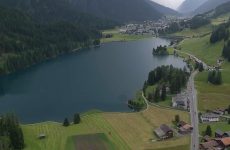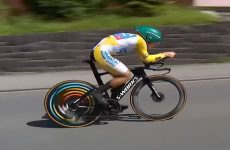Description
June 12, 2022
Tour de Suisse 2022 – Stage 1 – Küsnacht – Küsnacht : 177,6 km
There was a time when the Tour de Suisse was considered the third most prestigious stage race in the world.
Show more...
June 12, 2022
Tour de Suisse 2022 – Stage 1 – Küsnacht – Küsnacht : 177,6 km
There was a time when the Tour de Suisse was considered the third most prestigious stage race in the world. With its first edition debuting back in 1933, the week-long race has built up a rich history and has seen many of the sport’s most legendary names. The Tour de Suisse often starts with a short prologue, followed by a series of stages in the high-mountains. The race is renowned for sending riders up some of the highest altitude climbs in the sport of cycling, like the infamous Umbrail Pass – the highest paved road in Switzerland and a climb that ascends to a dizzying height of 2,501m. The race also often visits the gruelling Furka Pass and legendary St. Gotthard Pass – a road that climbs for more than 50km from some directions and features a staggering 38 switchbacks before the 2,106m-high summit. These three climbs have defined many editions over the race’s 89-year history, the most recent being that of the 2019 race – the edition won by Bernal.
Stephen Williams (Bahrain Victorious) took the biggest win of his career at stage 1 of the Tour de Suisse, where he took the first leader’s jersey at the eight-day race.
The 26-year-old Welshman was the fastest of a small group that emerged in the closing kilometres of the hilly race, and sprinted to the win ahead of Max Schachmann (Bora-Hansgrohe) and Andreas Kron (Lotto Soudal) in Küsnacht.
“It’s my first big race back since Romandie, and a good month of training. I was unsure where my form was going to be but I knew I had done the work before this. To win the first stage with a group like that was really special,” Williams said.
“So far, I don’t think it has sunk in yet, to be honest. It’s been a pretty strange few years, so to come here and win the stage – I’m over the moon.”
Williams has raced with Bahrain since 2018, but after experiencing knee problems he underwent surgery to remove the small fabella bone from his left knee at the end of 2020. He came back the following season and won the overall classification at the Cro Race.
Williams now leads the overall classification at the Tour de Suisse by four seconds ahead of Schachmann and six seconds on Kron as the race heads into stage 2 from Küsnacht to Aesch on Monday.
How it unfolded
The Tour de Suisse opened with a demanding 177.6km four-lap circuit race in Küsnacht. The route included back-to-back climbs along the circuit over Pfannenstiel, a 3.9km climb at 5% grade, and Küsnachter Berg, a reasonably short climb at 2.5km but with a 7.3% grade.
In between were three intermediate sprints at Gossau, with the race finishing just over the top of the Küsnachter Berg in Küsnacht.
Seven riders emerged in an early breakaway with Davide Villella (Cofidis), Casper Pedersen (Team DSM), Mike Teunissen (Jumbo-Visma), Johan Jacobs (Movistar Team), Quinn Simmons (Trek-Segafredo), Chad Haga (Human Powered Health) and Simon Vitzthul (Swiss Cycling).
While Brent Van Moer (Lotto Soudal) attempted to bridge the move, he only made it part way before the peloton scooped him back up ahead first climb over Pfannenstiel.
As the peloton eased off over the climb, the gap to the seven men ahead stretched out to four minutes.
After the two opening climbs, which were not part of the mountains classification, Simmons won the intermediate sprint in Gossau and took three seconds in bonuses and four points toward that classification.
Their gap dropped to 2:30 into the second circuit, with QuickStep-AlphaVinyl setting the pace.
Jacobs beat Simmons and Vitzthum across the line over the top of the Pfannenstiel to open the mountain classification with three points. But Simmons proved strongest over the steeper Küsnachter Berg, where he beat Vitzthum and Jacobs.
Simmons then padded out his lead in the sprint classification with another four points and picked up another three second in time bonuses at the second intermediate sprint, this time ahead of Pedersen and Jacobs.
Askey struggled to keep the pace and was briefly distanced but caught back up at the start of the third lap.
The gap continued to sit at 2:25 as the breakaway hit the next set of climbs, where Vitzthum took the points over the top of the Pfannenstiel and Simmons took the points over the Küsnachter Berg.
Ineos Grenadiers and BikeExchange-Jayco took over the front of the peloton at this point. The gap to the break dropped to one minute they raced through the third and final intermediate sprint, again won by Simmons with a lead of 12 points. However, with 12 points available at the finish, his lead in the points classification was not sewn up.
Well into the final lap, only four breakaway riders remained with Simmons, Vitzthum, Haga and Pedersen. Still, as they looked over their shoulders, they could see the shadows of the looming peloton led by EF Education-EasyPost just 25 behind.
As the pace quickened, Peter Sagan (TotalEnergies) was dropped from the main field with 20km left of the circuit.
Simmons grabbed more points over the top of the Pfannenstiel before he, too, was caught by the charging peloton. However, he earned 13 points on the day and now leads the mountain classification.
Pedersen and Vitzthum managed to hang on to a slight seven-second lead in the final six kilometres of the stage, but as the race livened up behind, they too were caught before the last climb.
Headed toward the final ascent of the Küsnachter Berg, EF Education-EasyPost’s Neilson Powless was the first to surge out of the field.
He was quickly followed by Stefan Küng (Groupama-FDJ), then Jakob Fuglsang (Israel Premier Tech), and Remco Evenepoel (QuickStep-AlphaVinyl).
The field split apart inside 2.5km to go, and a group of about 20 riders emerged out front, heading into the Küsnachter Berg.
Aleksandr Vlasov (Bora-Hansgrohe) made a searing attack in the last kilometre, but Evenepoel quickly followed him. A split front group over the top of the climb then came back together in the lead-in to the finale.
Evenepoel led the field into the last 500 metres, which were still uphill, but he was swarmed as the speeds increased into the sprint for the stage win.
Williams proved the fastest in that small group of about 15 riders and took the stage win, the first overall leader’s jersey and the points classification jersey.
Results :



























